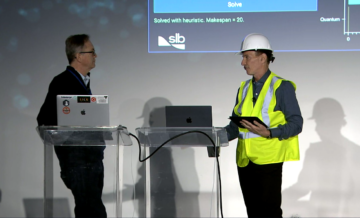
By Kenna Hughes-Castleberry posted 05 Apr 2024
IQT’s “Journal Club” is a weekly article series that breaks down a recent quantum technology research paper and discusses its impacts on the quantum ecosystem. In this article, we discuss a new Arxiv paper written by researchers from Kent State University, Western Michigan University, Middle Georgia State University, East Valley Cardiology in Arizona, National Quantum Literacy Network in Baltimore, INA Solutions Inc. in Virginia, and . Office of Research Innovation and Advocacy, and School of Community Health and Policy at Morgan State University. The paper focuses on the intersection between quantum technologies and healthcare, discussing how to make the latter more quantum-ready for future applications.
The advent of quantum technologies in public health marks a pivotal shift in how we approach healthcare and disease management. Quantum computing, cryptography, and sensing are innovations set to revolutionize various sectors, including materials science and drug discovery. However, their potential impact on healthcare has been relatively overlooked, indicating a critical gap in recognition and preparation. In a new Arxiv paper, researchers from various universities and companies look at how to apply quantum technology to the healthcare industry, including possible challenges and benefits.
A Lack of Quantum Understanding in Healthcare
The researchers mention that applying quantum principles to public health could transform disease surveillance, prediction, modeling, and analysis of health data. Yet, there is a notable lack of quantum expertise within the public health workforce and educational pipelines. This gap highlights the urgent need for the development of quantum literacy among public health practitioners, leaders, and students to leverage emerging opportunities while addressing risks and ethical considerations.
Innovative teaching methods, including interactive simulations, games, visual models, and other tailored platforms, present viable solutions for bridging knowledge gaps without requiring advanced physics or mathematics. However, the window for adaptation is narrowing as the quantum era in healthcare approaches necessitates urgent updates in educational approaches, workforce strategies, data governance, and organizational culture to meet the challenges of quantum disruption.
Where Quantum Is Already in Public Health
The Cleveland Clinic’s unveiling of the world’s first quantum computer dedicated to healthcare research in 2023 exemplifies the potential of quantum computing in revolutionizing the healthcare sector. This initiative, leveraging the IBM Quantum System One, aims to reduce the timeline for new therapies and foster collaboration across related industries, signifying a major technological advancement and emphasizing the need for quantum-literate talent in health and public health research.
Quantum technologies are already making strides in health sciences, from enhanced medical diagnostics and secure communication of sensitive health data to rapid analysis of complex epidemiological information. The analogy of classical computing states to infection states and the potential of quantum sensing and quantum dots in medical diagnostics and research illustrates these technologies’ profound impact on health outcomes and well-being globally.
The New Field of Quantum Health and Learning it
The researchers posit that the emergence of quantum health sciences, including quantum health epidemiology and informatics, represents a new cross-disciplinary domain synergistically combining quantum mechanical principles with health data. These fields leverage quantum advantages to achieve exponential speedups in data processing and machine learning over classical systems, offering new insights into disease patterns and risk distributions and optimizing health interventions.
The development of quantum literacy among the health and public health workforce is critical for the judicious adoption and implementation of quantum technologies. As the researchers find, creative interactive games, visual models, and virtual lab platforms show promise in demystifying quantum principles intuitively for non-physicists. These tools, alongside specialized education and career development programs, are essential for preparing a quantum-ready health workforce capable of leveraging quantum advancements ethically and equitably.
The Benefits and Challenges of Quantum in Healthcare
Integrating quantum technologies in healthcare and public health presents immense potential benefits and challenges. While quantum applications such as quantum machine learning, sensing, cryptography, and simulation offer transformative capabilities, their real-world implementation faces engineering challenges and requires ongoing hardware and software advances. Addressing these challenges, along with ethical, legal, accessibility, and workforce implications, is crucial for realizing the full potential of quantum health innovations.
While quantum health innovations hold significant promise, their thoughtful assessment and wise governance are essential to ensure they contribute to improving population health outcomes and reducing disparities. The time for action is now, as the quantum era in healthcare and public health is rapidly approaching.
Kenna Hughes-Castleberry is the Managing Editor at Inside Quantum Technology and the Science Communicator at JILA (a partnership between the University of Colorado Boulder and NIST). Her writing beats include deep tech, quantum computing, and AI. Her work has been featured in National Geographic, Scientific American, Discover Magazine, New Scientist, Ars Technica, and more.
- SEO Powered Content & PR Distribution. Get Amplified Today.
- PlatoData.Network Vertical Generative Ai. Empower Yourself. Access Here.
- PlatoAiStream. Web3 Intelligence. Knowledge Amplified. Access Here.
- PlatoESG. Carbon, CleanTech, Energy, Environment, Solar, Waste Management. Access Here.
- PlatoHealth. Biotech and Clinical Trials Intelligence. Access Here.
- Source: https://www.insidequantumtechnology.com/news-archive/iqts-journal-club-quantum-readiness-in-healthcare-and-public-health-building-a-quantum-literate-workforce/
- :has
- :is
- 05
- 2023
- 2024
- 500
- a
- accessibility
- Achieve
- across
- Action
- adaptation
- addressing
- Adoption
- advanced
- advancement
- advancements
- advances
- advantages
- advent
- advocacy
- AI
- aims
- along
- alongside
- already
- American
- among
- analysis
- and
- applications
- Apply
- Applying
- approach
- approaches
- approaching
- apr
- ARE
- arizona
- article
- AS
- assessment
- At
- automotive
- automotive industry
- baltimore
- beats
- been
- benefits
- between
- breaks
- bridging
- Building
- by
- capabilities
- capable
- Career
- categories
- challenges
- club
- collaboration
- Colorado
- combining
- Communication
- community
- Companies
- complex
- computer
- computing
- considerations
- contribute
- could
- Creative
- critical
- crucial
- cryptography
- Culture
- data
- data processing
- dedicated
- deep
- deep tech
- Development
- Diagnostics
- different
- discover
- discuss
- discusses
- discussing
- Disease
- Disruption
- distributions
- domain
- down
- drug
- East
- ecosystem
- editor
- Education
- educational
- emergence
- emerging
- emphasizing
- Engineering
- enhanced
- ensure
- Era
- essential
- Ether (ETH)
- ethical
- exemplifies
- expertise
- exponential
- faces
- featured
- field
- Fields
- finance
- Find
- First
- focuses
- For
- Foster
- from
- full
- future
- Games
- gap
- gaps
- geographic
- Georgia
- Globally
- governance
- Hardware
- Health
- healthcare
- healthcare industry
- healthcare sector
- her
- High
- highlights
- hold
- How
- How To
- However
- HTTPS
- IEEE
- illustrates
- image
- immense
- Impact
- Impacts
- implementation
- implications
- improving
- in
- Inc.
- include
- Including
- indicating
- industries
- industry
- infection
- information
- Initiative
- Innovation
- innovations
- inside
- Inside Quantum Technology
- insights
- interactive
- intersection
- intersections
- interventions
- into
- intuitively
- ITS
- journal
- knowledge
- lab
- Lack
- latter
- leaders
- learning
- Legal
- Leverage
- leveraging
- literacy
- literate
- Look
- machine
- machine learning
- magazine
- major
- make
- Making
- management
- managing
- many
- materials
- mathematics
- max-width
- mechanical
- medical
- Meet
- mention
- methods
- Michigan
- Middle
- modeling
- models
- more
- Morgan
- National
- necessitates
- Need
- network
- New
- nist
- notable
- now
- of
- offer
- offering
- Office
- on
- ongoing
- opportunities
- optimizing
- or
- organizational
- Other
- outcomes
- over
- Paper
- Partnership
- patterns
- Physics
- pivotal
- Platforms
- plato
- Plato Data Intelligence
- PlatoData
- policy
- population
- possible
- posted
- potential
- prediction
- preparation
- preparing
- present
- presents
- principles
- processing
- profound
- Programs
- promise
- public
- public health
- Quantum
- Quantum Computer
- quantum computing
- quantum machine learning
- quantum technology
- rapid
- rapidly
- Readiness
- real world
- realizing
- recent
- recognition
- reduce
- reducing
- related
- relatively
- represents
- requires
- research
- researchers
- revolutionize
- Revolutionizing
- Risk
- risks
- s
- School
- Science
- SCIENCES
- scientific
- Scientist
- sector
- Sectors
- secure
- sensitive
- Series
- set
- shift
- show
- significant
- signifying
- simulation
- simulations
- Software
- Solutions
- specialized
- State
- States
- strides
- Students
- such
- surveillance
- system
- Systems
- tailored
- Talent
- Teaching
- tech
- technological
- Technologies
- Technology
- that
- The
- their
- therapies
- There.
- These
- they
- this
- time
- timeline
- to
- tools
- Transform
- transformative
- true
- understanding
- Universities
- university
- unveiling
- Updates
- urgent
- used
- Valley
- various
- viable
- virginia
- Virtual
- visual
- we
- weekly
- Western
- while
- window
- WISE
- with
- within
- without
- Work
- Workforce
- world’s
- writing
- written
- yet
- zephyrnet












